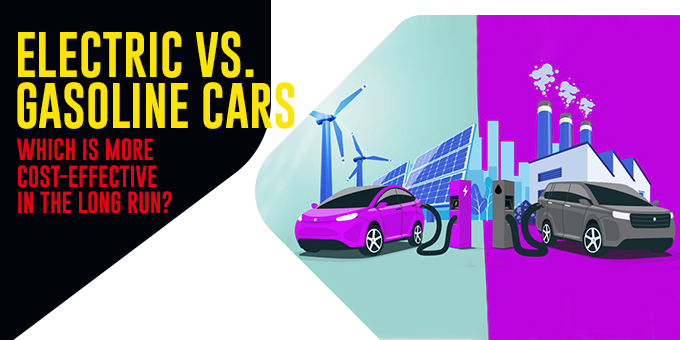Cost-effectiveness is frequently the deciding factor when choosing between gasoline and electric vehicles. With rising fuel prices and concerns about environmental impact, many car buyers wonder whether an electric vehicle (EV) offers better long-term savings compared to a traditional gasoline car. While the upfront cost of an EV may seem higher, various factors influence the total ownership expenses over time. Understanding the differences in fuel costs, maintenance, and incentives can help determine which option provides the best financial advantage.
Initial Purchase Price
Gasoline cars have traditionally been more affordable than electric vehicles. Most fuel-powered cars come in a wide range of prices, offering buyers flexibility based on their budget. On the other hand, because of their costly battery technology, EVs are frequently more expensive initially. However, prices are steadily decreasing as advancements in battery production and government incentives make electric cars more accessible.
Electric vs. Gas Car Fuel Efficiency and Operating Costs
An important consideration in assessing cost-effectiveness is fuel economy. In terms of energy usage, electric automobiles do better than gasoline-powered ones. Whereas the efficiency of gasoline-powered vehicles is measured in miles per gallon (MPG), that of electric vehicles is measured in miles per kWh.
Over time, significant fuel savings result from the substantially lower cost of electricity compared to gasoline. Compared to a conventional fuel-powered vehicle, an electric vehicle has a lower average cost per mile. Furthermore, charging at home overnight with lower electricity rates further enhances savings. Public charging stations, particularly fast chargers, may have higher costs but still offer competitive pricing compared to fluctuating gasoline prices.
Maintenance and Repairs
Lower maintenance expenses are one of the key benefits of electric vehicles. Because EVs have fewer moving parts than internal combustion engine (ICE) cars, they don't require transmission maintenance, exhaust system repairs, or oil changes. Additionally, regenerative braking prolongs the life of brake components by reducing wear and tear. However, the cost of battery replacement for EVs is still considerable, which is often the reason people are reluctant to switch to electric vehicles.
Regular maintenance is necessary for gasoline-powered vehicles, including fuel system upkeep, spark plug replacements, and oil changes. Over time, these expenses accumulate, making fuel-powered cars more costly to maintain. While EV battery replacements can be expensive, modern battery technology offers extended lifespans, often exceeding 200,000 miles.
Government Incentives and Tax Benefits
Government incentives can significantly impact the cost-effectiveness of electric cars. To promote the use of EVs, several nations provide tax breaks, refunds, and lowered registration costs. These incentives lower the initial purchase price and offset higher upfront costs.
Gasoline cars do not receive such benefits, making them relatively more expensive in the long run. Additionally, some cities impose congestion charges and higher road taxes on fuel-powered vehicles to promote cleaner transportation. These extra costs further tilt the balance in favor of electric cars.
Depreciation and Resale Value
Vehicle depreciation is another important consideration. Because of their widespread availability and proven market demand, gasoline-powered vehicles have historically had greater resale prices. However, as EV adoption grows, resale values for electric cars are improving.
Battery degradation concerns once made EVs depreciate faster, but advancements in battery technology will continue to further alleviate this issue. Some EV manufacturers offer extended warranties on battery packs, providing additional assurance to buyers. Gasoline cars, on the other hand, continue to depreciate with mileage and wear, particularly as stricter emissions regulations impact their market appeal.
Environmental Impact and Cost Savings
While financial factors are key, environmental benefits also contribute to cost-effectiveness. Since EVs have no tailpipe emissions, the air is cleaner and less polluted. Many governments encourage electric vehicle adoption to achieve sustainability goals, which may lead to further financial benefits for EV owners in the future.
Carbon dioxide and other pollutants released by gasoline-powered vehicles contribute to climate change and health issues. Some regions impose carbon taxes or fuel surcharges, increasing the cost of ownership for gasoline-powered vehicles. As clean energy sources become more prevalent, charging an EV with renewable electricity can further enhance cost savings.
Charging Infrastructure vs. Fuel Availability
Infrastructure for EV charging is a frequent worry. While gasoline stations are widely available, charging networks are expanding rapidly. Many EV owners install home chargers, ensuring convenient and cost-effective charging.
Public charging networks offer fast charging options, reducing downtime for long trips. However, gasoline-powered vehicles have the benefit of rapid refueling, which makes them more practical for long-distance driving without stopping. Over time, improvements in charging speed and station availability will reduce this gap, making EVs even more competitive.
Insurance Costs
Insurance rates for electric and gasoline cars can vary based on factors like repair costs and safety ratings. EVs sometimes have higher insurance premiums due to expensive battery repairs, but their lower maintenance costs and safety features can offset this. Because EV owners have fewer accident risks and environmental advantages, many insurers give them discounts.
Gasoline cars generally have stable insurance rates, but higher maintenance and repair costs can influence premiums. It is anticipated that insurance rates will become more competitive with traditional automobiles as EV technology becomes more widely used.
Long-Term Savings and Return on Investment
In terms of long-term cost-effectiveness, electric vehicles show definite financial advantages. Even though they cost more to buy initially, EV owners save a lot of money on fuel and upkeep. Government incentives and tax breaks further reduce the financial burden, making EVs an attractive choice for long-term savings.
Gasoline cars, while initially more affordable, incur higher operating expenses over time. Rising fuel prices and frequent maintenance contribute to increased costs, making them less cost-effective in the long run, as charging networks grow and technology advances, EVs will continue to provide more efficiency and savings.
Conclusion
Choosing between an electric and a gasoline car involves weighing short-term affordability against long-term savings. While gasoline cars remain widely available and have lower upfront costs, electric vehicles offer substantial savings on fuel, maintenance, and government incentives. EVs are becoming more useful and affordable due to developments in battery technology and expanding charging infrastructure.
In the long run, electric cars provide greater financial benefits, making them the smarter choice for drivers seeking cost-efficiency. As the automotive industry shifts toward sustainability, transitioning to an EV will not only save money but also contribute to a cleaner and greener future.




